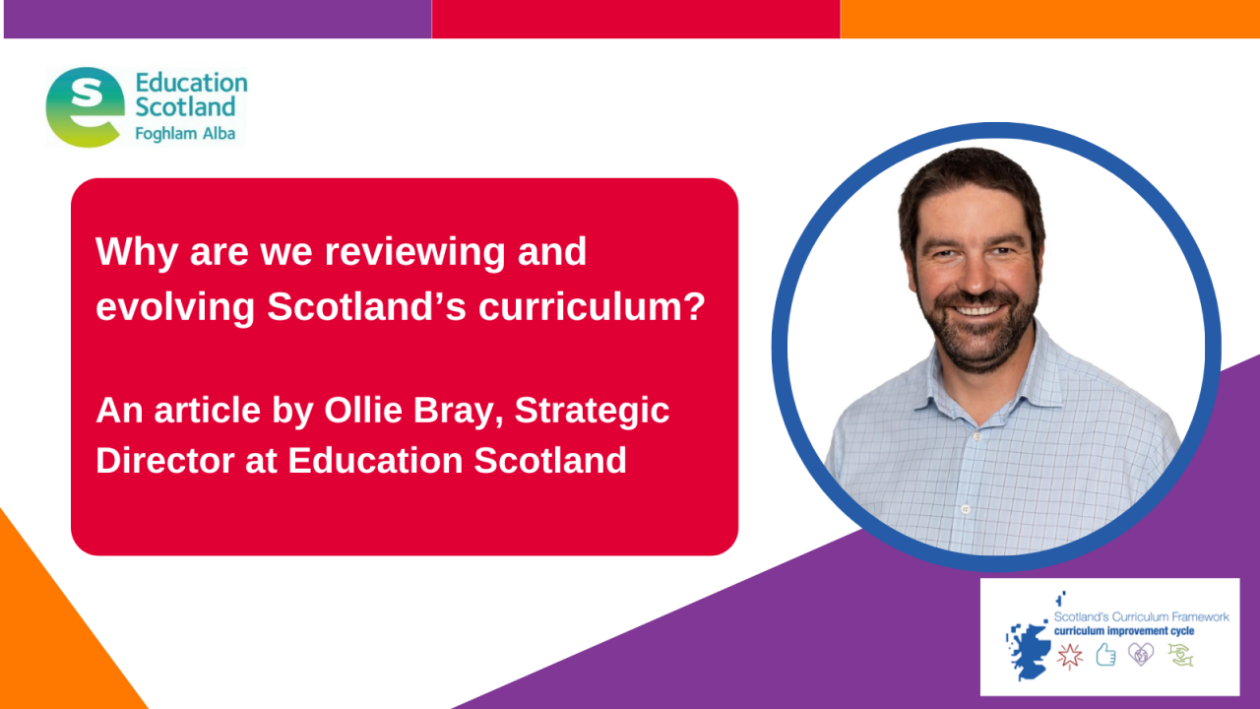
Ollie Bray, Strategic Director, Education Scotland
A process is now in place for reviewing and evolving Scotland’s Curriculum. In Scotland we are calling this the Curriculum Improvement Cycle (the CIC).
Well we are still at an early stage of the planning process and recognise that reviewing the curriculum will take time. There are some things that we do know such as: why are we doing the work? And what does the cycle of review look like? We are also clear on the immediate next steps and are committed to sharing a more coherent timetable for change in the summer term 2025.
In this short piece I explore, why are we doing this work?
The origins of the Curriculum Improvement Cycle (CIC) developed from recommendations contained within the 2021 OECD Review of Scottish Education (Scotland’s Curriculum for Excellence: Into the Future) which recognised the strengths of Curriculum for Excellence (CfE), and made a range of suggestions to ensure that this strength would persist into the future.
Included in its twelve recommendations was a specific recommendation on curriculum review. It stated that, Scotland should: “Develop a systematic approach to curriculum review: Scotland could consider establishing a curriculum review cycle with a planned timeframe and specific review agenda, led by the specialist stand-alone agency.”
“Develop a systematic approach to curriculum review: Scotland could consider establishing a curriculum review cycle with a planned timeframe and specific review agenda, led by the specialist stand-alone agency.”
The OECD had correctly identified through its study of the Scottish system that Scotland did not have a process in place to regularly review its curriculum. The OECD also observed that due to the prominence of education in political debate – changes to curriculum often occurred in response to criticism, controversy or one set of attainment data rather than in a planned and proactive way.
The unintended consequence is that Scotland’s Curriculum often evolved in a reactive and inconsistent way resulting at times in more suggestions of extra things that schools and settings should do. This does not allow for the opportunity to, for example, have an overview of the whole curriculum to address issues such as overload. Over time this has also led to an over-reliance on external independent reviews rather than creating internal capacity for curriculum review within the system. It has also resulted in intense focus on some areas of the curriculum, but very little focus on others.
Nearly two years after the publication of the 2021 OECD Report in May 2023 the National Discussion on Scottish Education (See: All Learners in Scotland Matter – national discussion on education) also made recommendations regarding curriculum review. In its call to action, in the section focused on curriculum, the conveners of the discussion (Professor Carol Campbell and Professor Alma Harris) concluded,
“A regular curriculum review process should be established to ensure that the curriculum remains fit for purpose, reflects contemporary learner needs, and can be effectively delivered in ways to ensure that all learners in Scotland have high quality curricular-linked learning experiences.“
“As part of the review of the curriculum the technical framework of the BGE (including the Experiences and Outcomes) needs to be re-visited to ensure it is still fit for purpose and aligns with emerging recommendations about the Senior Phase from the Independent Review of Assessment and Qualifications.”
This call to action again recognised the need and importance to establish a systematic review cycle for Scottish Education.
The Cabinet Secretary for Education and Skills announced the establishment of the Curriculum Improvement Cycle (the CIC) for Scotland in December 2023. Education Scotland was commissioned by the Scottish Government to lead the work in April 2024. Well maths and numeracy has been announced as the first area to be reviewed and we have now started to develop plans to review the totality of the curriculum.
Importantly, in Scotland we define the curriculum as, the totality of all that is planned for children and young people throughout their education.
The curriculum is defeined as the totality of all that is planned for children and young people throughout their education.
This curriculum totality can be planned for and experienced by learners across four contexts for learning: the ethos and life of the school as a community; opportunities for personal achievement; interdisciplinary learning; and curriculum areas and subjects.
Understanding the Scottish definition of ‘curriculum’ and understanding where the curriculum can be experienced across the four contexts for learning is important because some education commentators have a narrower view of curriculum, some even get ‘curriculum’ confused with ‘content’. This is not to say that content isn’t an important part of curriculum, but it is not the only part. When we confuse definitions of curriculum (and other key terms) we risk using the same words but talking about completely different things – this is, in my opinion, one of the biggest bear traps of education reform across the world.
In my next piece I will talk more about how we developed the model for Curriculum Review in Scotland.
If you are keen to hear and learn more about the Curriculum Improvement Cycle (CIC) you might be interested to listen to the latest Education Scotland Learning Conversations Podcast with Education Scotland’s Chief Executive Gillian Hamilton and myself on the CIC or read this recent article from TESS Scotland – CfE review: ‘Evolving Curriculum for Excellence, not ripping it up’.

